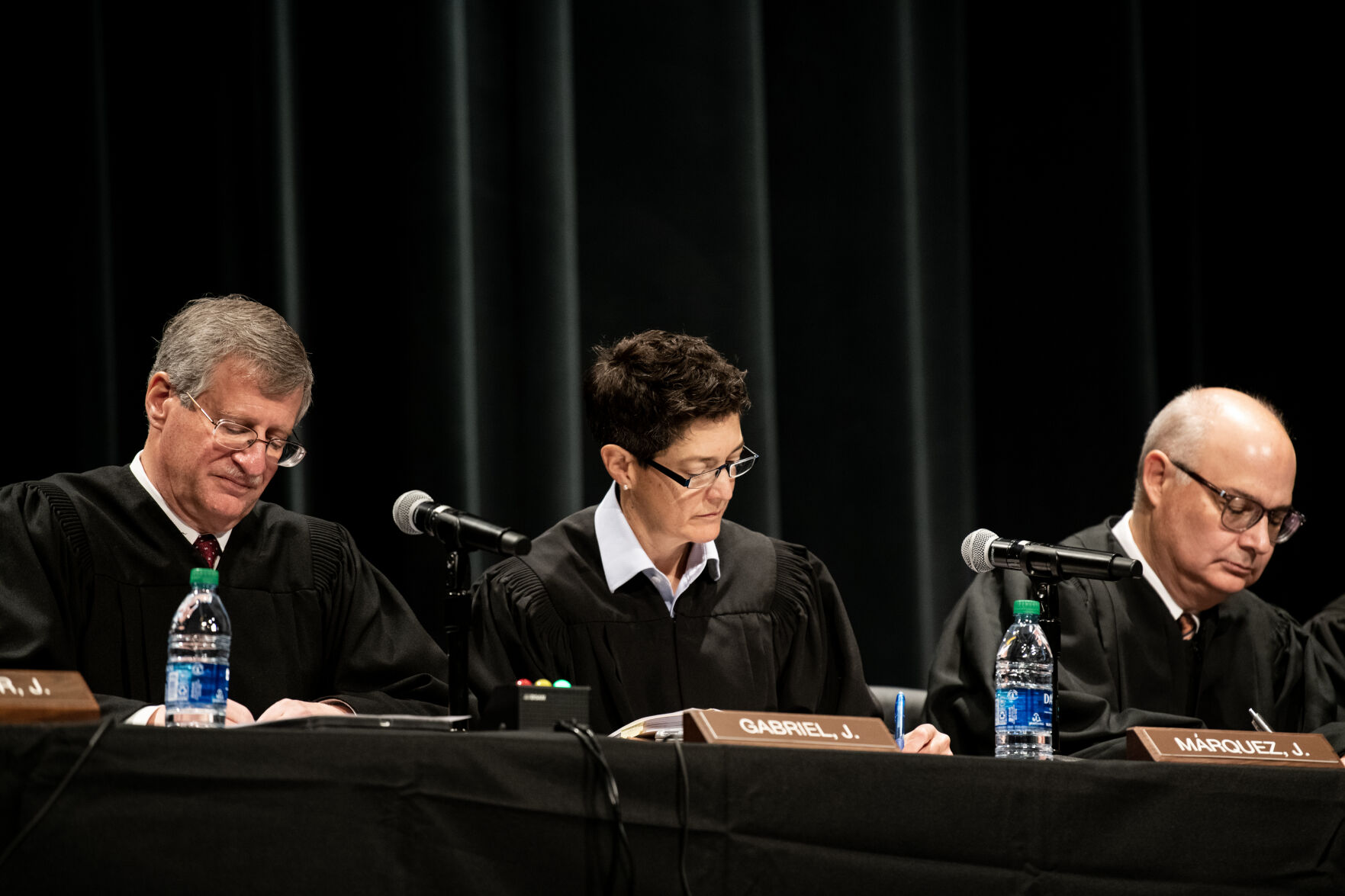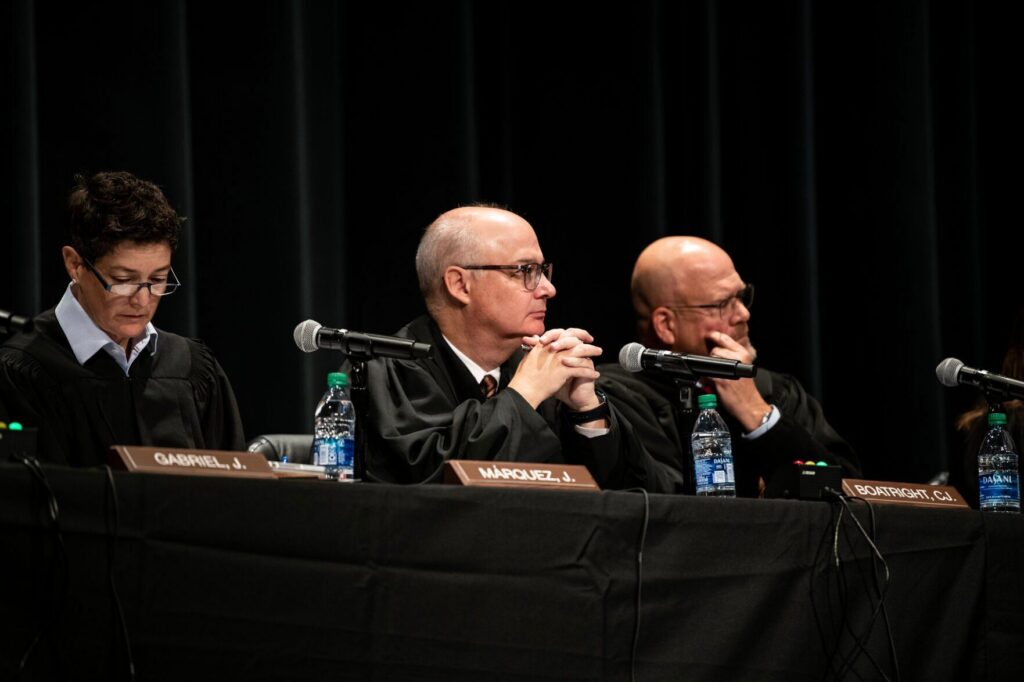Colorado Supreme Court considers whether local governments may sue over state decisions

If local governments in Colorado are unable to challenge the state’s actions in court, it may be because of Martin.
“Martin” is not a person, but rather a rule developed by the Colorado Supreme Court over several decades. As it stands, government entities cannot seek judicial review of a state agency’s act when they are “subordinate” to the agency in question and the law has not authorized them to sue.
However, during oral arguments on Tuesday, multiple members of the current Supreme Court acknowledged the evolution of the “Rule of Martin” has rendered it baffling even to them.
“I find this whole area – and our jurisprudence in this area – wildly confusing and scattershot,” said Justice Monica M. Márquez.
“It’s so broad now it’s hard to get my hands around it,” added Justice Richard L. Gabriel.
The Rule of Martin, named for a 1976 Supreme Court decision, is itself being challenged by two local governments – Weld County and Adams County School District 14. The plaintiffs’ underlying grievances pertain to very different areas of state policymaking: inspection requirements for oil and gas wells, on the one hand, and the allegedly discriminatory application of a school performance law, on the other.
In each case, lower courts dismissed the challenges to Colorado’s state-level decision making, citing the Rule of Martin.
“If the courthouse door is open to school districts themselves to say, ‘I disagree with this. I disagree with that. The legislature can’t make me do this,'” argued former solicitor general Eric R. Olson on behalf of the state, “what you’ve done is you’ve thrown sand in the gears of a system.”
But Justice Carlos A. Samour Jr. observed that, under the rule, a state agency can effectively serve as the prosecutor, the judge and the appellate body, with no opportunity for the courts to review unreasonable decisions.
“Sure, that’s more efficient than if the courts are involved. But is that really the best system and should we worry about that kind of system?” he wondered.
In the case out of Weld County, the Colorado Air Quality Control Commission adopted new regulations in 2020 governing the inspection of wells for leaking gas. The county, which is the largest producer of oil and gas in the state, estimated that 35% of well operators would have to shut down if the new rules passed.
Following the commission’s adoption of the regulations, Weld County sought judicial review, alleging the commission failed to follow proper procedure during the rulemaking.
The Court of Appeals agreed the Rule of Martin applied, given that Weld County was a subordinate agency to the commission when it comes to air quality control, and the law had not granted it the right to sue.
Meanwhile, Adams 14 had been on “turnaround” status for several years under the 2009 Education Accountability Act. The Colorado State Board of Education directed the district to begin the reorganization process triggered by a failure to improve. According to the district, the state’s actions caused staff resignations, students to flee Adams 14 and a downgrade in its bond rating.
Adams 14 sued the state board alleging it violated the district’s rights and that the Accountability Act was being applied discriminatorily against Adams 14’s largely Hispanic, low-income and English-learning population of students.
Although Adams 14 asserted the Colorado Constitution’s guarantee that local school boards have “control of instruction” in their districts empowered it to sue, Denver District Court Judge Shelley I. Gilman believed otherwise.
“The local control provision clause provides school districts with authority to control instruction in the public schools in their districts but does not provide them with standing to challenge the constitutionality of the Education Accountability Act, a statute directing their performance,” she wrote.
The cases both came before the Supreme Court, with the government largely arguing for preserving the Rule of Martin and the challengers suggesting modifications. Weld County claimed the original purpose of the rule was much narrower, namely to prevent state agencies from suing each other and inserting the courts into executive branch conflicts.
But the county’s proposal to open up more opportunities for litigation, countered Olson, “would give a disappointed political body a chance for a redo in the courts.”
Members of the court were skeptical that Weld County had standing to sue based on its dissatisfaction with how private well operators might choose to respond to state regulations, and the justices reminded Adams 14 that the constitution gives the state board of education supervisory authority over public schools.
For the Rule of Martin itself, however, the justices expressed their discomfort to the state over the prospect of having wrongful agency decisions rendered unreviewable if a local government is the one asking for review.
“The reason this school district is in so much difficulty – this is lower income, disadvantaged students. … It seems a little incongruous to expect these students and their parents to bring this kind of lawsuit,” Gabriel said. “This would seem to be the quintessential place where the school district might want to represent the interests of its students.”
Olson responded that school performance was “an issue of concern for all of us,” but having judges “second-guess” the state’s decisions and slow things down would be improper.
“There’s no question that our current system can be improved,” he said, “but the question is who improves it? Is it the seven of you or the legislature?”
If the Supreme Court does loosen the Rule of Martin, said Samour, “can you try to make us feel better about the concern related to the floodgates being open? That we’re going to end up with school districts filing all these lawsuits whenever they don’t agree with a decision of the state board?”
Joseph A. Salazar, attorney for the school district, replied that this was the first case of its kind since the enactment of the Accountability Act – demonstrating the lack of any flood of litigation. He argued when the state board does not operate fairly, school boards should be able to challenge that themselves.
“Our students are poor. They’re probably never, likely, gonna fight for themselves,” Salazar said.
Supporting the parties were:
? Colorado Counties, Inc., which backed up Weld County’s request to reform the Rule of Martin
? The Colorado Department of Human Services and Colorado Department of Early Childhood, which argued the principles behind the Rule of Martin existed for more than 100 years and should remain unaltered
? The Colorado Association of School Boards and Colorado Association of School Executives, which believed the constitution grants school districts the right to sue the state board
The cases are Weld County Board of County Commissioners v. Ryan and Colorado State Board of Education v. Adams County School District 14.














